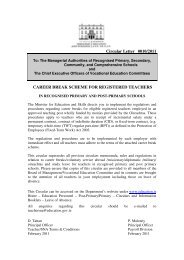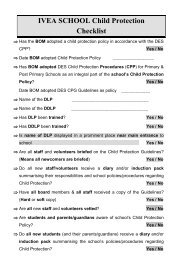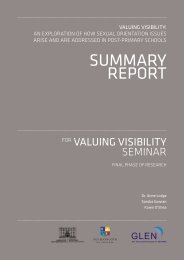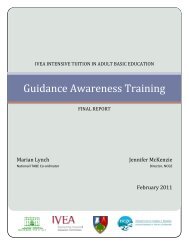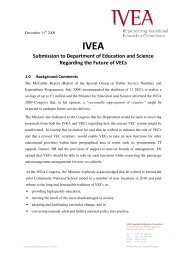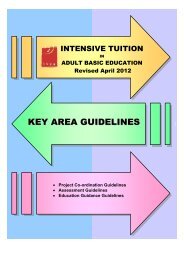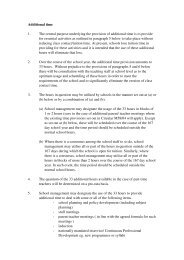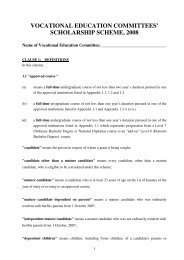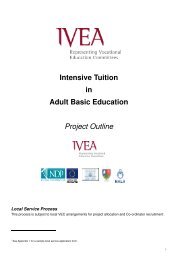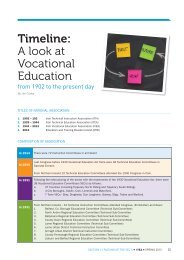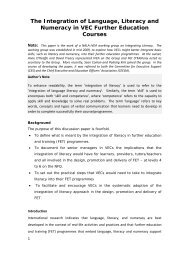Download File - IVEA
Download File - IVEA
Download File - IVEA
You also want an ePaper? Increase the reach of your titles
YUMPU automatically turns print PDFs into web optimized ePapers that Google loves.
Over one hundred delegates including CEOs; EOs; AEOs; ALOs; VTOSCo-ordinators; practitioners; and VEC administrative staff attendedthe workshops. <strong>IVEA</strong> received valuable feedback from delegates andhas incorporated their suggestions and comments into the presentdocument. In addition, the National Adult Literacy Agency (NALA) andother non-governmental organisations (NGOs) gave feedback to <strong>IVEA</strong>on the publication.<strong>IVEA</strong> will adopt a similar consultative approach for the FurtherEducation sector.The <strong>IVEA</strong> working group is currently conducting research on theeducation and language needs of migrant workers.1.2 FURTHER RESEARCH ANDDEVELOPMENT WITHIN THEVOCATIONAL EDUCATION SECTORSeveral VECs have been involved in research on the education andlanguage needs of refugees, asylum seekers and other minoritylinguistic groups since 2001. The White Paper on Adult Education,Learning for Life, (2000) 14 made adult asylum seekers eligible forlanguage and literacy support through the VECs and recommendedthat a study should be undertaken on their language needs. Inresponse, the City of Dublin VEC, in association with County DublinVEC, initiated a major research project on adult asylum seekers.Researched and written by Tanya Ward, the report was entitled– Asylum Seekers in Adult Education: A Study of Language andLiteracy Needs (2002). Considering provision for asylum seekersholistically, this research stresses that language/literacy issues areinextricably linked to equality and interculturalism. The researchadvocates a learner centred and needs based approach for thedelivery of programmes through a mainstream state adult educationservice. Written from a gendered perspective, particular attention ispaid to survivors of torture and people with disabilities.The City of Dublin VEC and County Dublin VEC have also publishedanother report entitled: Immigration and Residency in Ireland: AnOverview for Education Providers (2003). Providing up-to-dateinformation and statistics, this document outlines the social/economicrights that pertain to each immigrant group residing in Ireland. Thisdocument was widely distributed to all other VECs.The Dublin based VECs record of research in this area indicatesthat with adequate funding, VECs can draw on expertise within theirorganisations and be at the forefront of research and development.The work of the CDVEC in educational provision and research forasylum seekers, refugees and, in particular, separated children wasrecognised by the United Nations High Commissioner for Refugees(UNHCR) when it received a Certificate of Recognition in June2003. This is only the second time an Irish based organisation waspresented with this award.The <strong>IVEA</strong> recognises the importance of supporting VECsand their colleges/centres/programmes/educational institutions 15in meeting the needs of minority linguistic groups including asylumseekers and refugees. VECs are invited to implement the suggestedframework on a pilot basis in 2004/5. <strong>IVEA</strong> will revise guidelines,incorporating VEC and learner feedback, to ensure that the schemefully meets the needs of learners and providers.1.3 SUGGESTED FRAMEWORKThe overall strategy adopted by the <strong>IVEA</strong> following publication of the<strong>IVEA</strong> Policy on Educational Provision for Asylum Seekers, Refugeesand other Non-nationals in 2001 was to prepare implementationguidelines for the following areas of VEC activity:• Adult and Community Education (Lifelong Learning);• Second Level;• Further Education.During the research, separated children were identified asexperiencing immense difficulties accessing and remaining ineducation. Supported by the Department of Education and Scienceand working in collaboration, the City of Dublin VEC, County DublinVEC and Dun Laoghaire VEC initiated a research project on theeducation/language needs of separated children in 2001. The projectaims to compile a profile of separated children living in Dublin andevaluate current educational provision, paying particular attention to:equality and anti-discrimination; reception and orientation; supportingbilingual/multilingual students in schools; teaching materials; schoolattendance; guidance; and student supports. The Dublin based VECswill publish this research in 2004.The present document focuses on the Further Education sector.The Department of Education and Science-compiled DraftRecommendations Towards a National Action Plan AgainstRacism states:Future polices must be developed within the context of arights based equality approach, catering for diversity asthe norm within all education settings. This approach needs tobe taken account of in the intrinsic design of systems 16 .Incorporating such an approach, the aims of the presentdocument are to:• Prepare the community of the college/centre/programme/14Hereinafter “The White Paper” and/or “Learning for Life” refers to the Government White Paper on Adult Education, Learning for Life, 2000.15Please note that in the context of this document the term “educational institution” refers to Further Education colleges and centres and any other VEC venue at which a Further Education course/programme is available.16Promoting Anti-racism and Interculturalism in Education: Draft Recommendations Towards a National Action Plan Against Racism, Department of Education and Science: 2003 (unpublished): p. 26.11



